- Home
- Anne Easter Smith
This Son of York Page 15
This Son of York Read online
Page 15
“Straighten your bonnet.” Meg could not resist acting the older sister, and Cecily had insisted that Margaret take the role of mother hen when Edward had given his siblings Greenwich for their new residence. “I will be staying close to Edward, my dear,” Cecily had told her. “He needs my guidance in governance until he sees how the land lies.”
“You will tell George and Richard they must listen to me, will you not, Mother?” Margaret pleaded with as much boldness as she dared. Proud Cis could be motherly when it suited her, but mostly she demanded obedience from her children.
As they mounted the spiral staircase on the river entrance to the royal apartments, Richard was losing his confidence. He was unsure what the ceremony would entail. Remembering the night-long rituals of the Order of the Bath, he prayed he would not be stripped naked again in front of the court. His upper body was developing outwardly, but he still hated his spindly legs.
He was relieved to see the sunlit audience chamber was only half-filled, and then there was Edward striding towards him, a smile of welcome on his handsome face. Richard went down on his knees at once and snatched off his hat. He should have known better than to speak before the king did but he could not stop himself from saying: “God’s greeting, Your Grace.”
Edward ignored the lapse in protocol. Indeed, since becoming king, he had shocked some old-fashioned nobles by resting a royal hand on some lesser man’s arm, or even slapping a shoulder playfully. He was an amicable, friendly man, at ease with others and happiest in company. In only a few short months of kingship, he had earned the respect and devotion of many a hardened noble, and as well the commoners loved him, albeit for the blessed cessation of interminable warfare.
“My dear brother,” Ned said warmly, raising Richard to his feet. “You look every inch a duke today, I might say. Will,” he turned to his friend and confidante Hastings, “do you not think Richard will suit his new title?”
Hastings winked at Richard. “Every new inch,” he said, reminding Richard of their conversation in the forest.
At last, the stiff little boy relaxed his face into a smile. “You really think so, my lord?”
“Aye, lad, you are growing nicely,” Edward’s chamberlain replied.
“Let us start the proceedings, shall we?” Edward propelled his young brother towards the dais. Standing on the steps, the king held up his hand, and at once the court fell silent. He motioned Richard to stand a step below him, and it was only then that Richard saw his mother standing quietly watching him from behind the throne. He bowed his head quickly, and she smiled at him. Jesu, but she is the most beautiful woman in the world, Richard thought proudly. Regal, elegant, her thick blonde hair now hidden under a hennin, her fashionably plucked brow accentuating her large, bright blue eyes, she wore her forty-seven years easily. And, no one would doubt that Edward, Margaret, or George were her offspring. Only Richard resembled his smaller, darker father.
“Cousin, welcome!” Edward’s cheerful baritone carried down the hall to the figure now striding towards the dais. Richard Neville, earl of Warwick, was to read the proclamation announcing Richard as England’s newest duke.
Richard was pleased to see the earl, who had played such a vital role in putting a Yorkist king upon the throne. He was known to prefer the north of England, and had even been absent for the coronation while he helped put down small rebellions north of the River Tweed.
“An auspicious occasion, n’est pas?” Warwick’s familiar bark no longer frightened Richard, and he nodded earnestly and replied, “Aye, my lord.”
“Your Grace, my lords, ladies….we are here to bestow the highest honor in our kingdom on our beloved Richard Plantagenet. From henceforth, he shall be known as Richard, duke of Gloucester, and shall receive all the benefices due to the holder of that noble name.” An usher came forward with a velvet cushion on which lay a silver collar bearing a heavy badge emblazoned with the royal arms of the kingdom, differenced by a bordure argent. Richard was glad to see his other Neville cousin, bishop of Exeter and Edward’s chancellor, approach the dais to bless the collar. “In nomine patris, filii et spiritus sancti” the bishop began, and all present crossed themselves.
Richard worried if he were old enough or wise enough to take on this great responsibility. No one had schooled him in what it meant to be a duke of a large area of the country with which he was not even familiar, but he knew he was every bit as capable as George. Besides, George’s new title had not seemed to change anything about his brother’s life yet—except make him more annoying—and so Richard assumed he would eventually learn what was required of him when he became a man. He bent his head as Warwick slowly placed the heavy collar over his shoulders and then solemnly grasped Richard’s hand.
The earl turned back to the assembled court and in a loud voice cried, “Let me present to you his grace, the duke of Gloucester. God give him the strength to govern well.”
When the trumpet fanfare’s echo died, the hairs on Richard’s neck prickled as he found himself moved beyond measure by this great moment in his life. He vowed to be faithful to God and true to Edward forever and always.
If Richard expected his life to change in that moment, he was to be bitterly disappointed. When would he be sent away to begin his knightly training, he wondered month after tedious month. It may have been named for the beauty of its gardens and aspect, but the Palace of Pleasaunce, as Greenwich was called, became synonymous with a luxurious prison for the young impatient Richard. What’s the use of being a royal duke if I don’t even know how to defend myself, let alone my people? he silently grumbled.
It did not help when, after a year of obscurity for the three siblings, George was called to Westminster to set up his own household at the king’s side as befitted the heir to the throne. However, it was a relief not to have the daily reminder of “you forget I’m next in line, Richard,” thrown in one’s face.
George’s arrogance aside, the thought that he was forgotten again irked Richard more as he chose to climb the hill to the ruined tower, once the pride of a previous duke of Gloucester, to watch George being conveyed up the Thames in the king’s barge. He sat with his arm around Traveller’s neck at the foot of it and gazed with longing at the far away spires of London. “I’ll be stuck here forever,” he told his faithful friend.
Chapter Nine
Spring – Summer 1464
Richard had never been happier.
Many would have guessed it was because of the beauty of the wild Yorkshire landscape, the excitement of mastering a shortsword or dagger, the unaccustomed camaraderie of a dormitory filled with eager youths his age, or the bracing, clean air that filled his lungs and made him feel alive. Those were factors, it is true, but it was more personal than that: he was no longer compared with and tormented by George. No one here knew George, and he had, for the first time, known a freedom from family friction. Here at Middleham he could form his own opinions and become his own man. The thought had struck him one bright July morning as he rode out of the castle yard through the squared gatehouse with his friend Robert Percy of Scotton. He suddenly gave a gleeful whoop and kicked his mare’s flanks into a canter.
The two youths had taken to sneaking in a daily early-morning gallop across the meadows behind the hulking gray castle, which dominated windswept Wensleydale for miles around. Emerald green fields dotted with sheep rolled over the hills to the bleaker moors beyond, meeting the unending sky in the middle distance, a landscape so empty of habitation its vastness reduced Richard and his horse to naught but specks.
Edward had described the region as “desolate and uncivilized” when he had given Richard the news that their cousin of Warwick had agreed to take on the task of training the youngest York son. But Richard, elated at the thought of realizing his dream of knighthood, not to mention escaping the confines of Greenwich or the Royal Wardrobe, where Edward had housed his siblings in the years since his coronation, paid no heed. He had broken with protocol and flung his arms about his ido
l and vowed he would be as fine a warrior as Edward when he became a man. “I will never let you down, Ned,” eleven-year-old Richard promised. Much amused by this show of affection, Edward had turned to Hastings, and, as Richard ran off, remarked: “One cannot ask for more devotion even from a dog. I fear my pedestal is so high, you will need a ladder to reach me, Will.”
Edward’s description of the north had thus fallen on biased ears, and instead, Richard had fallen in love with his new home from the first moment he and his escort had their first view of Middleham more than a year before on the eastern road from York along the edge of the dales. He would soon get to know the elemental beauty of the area with its crystal-clear cascading waterfalls coming from the Pennines, its lush, upland, sheep- and cow-crowded meadows rising to the barren moorland hills, where the limestone, sandstone, and shale outcroppings had long lent themselves to ancient stone walls and isolated farmhouses. Richard learned that prehistoric man had lived there, trading the bronze and iron they dug from those hills, and much later the Romans had come, building a fort at Bainbridge, a few miles from Middleham. The upper dale was densely forested, creating perfect hunting grounds for a king—or in his absence, his cousin, the earl of Warwick.
It was into a forest to the west of the castle that Richard and Rob went riding that day, a groom following them in case of a mishap to the king’s brother. Rob, the older of the two, was leading the way hoping to catch a glimpse of a small group of roe deer that had been spotted the day before near a tumbling beck well known to the henchmen—as Richard, Rob and the other noble boys in knightly training were termed. They were not permitted to hunt without adult supervision, but they were hoping to enjoy the sight of a fawn or two.
“Mayhap we will come upon old King Henry instead,” Rob called in his pleasing northern brogue, “and then we would be exonerated from our escapade.” Poor mad Henry had been separated from the Lancastrian forces after the battle of Hexham, at which Warwick’s brother Montagu was victorious. The erstwhile king was rumored to now be roaming the Pennines as a fugitive.
“I feel sorry for him,” Richard replied, remembering the gentle man in the Westminster chapel. “But he was not a good king—although my lady mother thinks he is a good man.” Young Dickon had had trouble understanding this paradox, but now he knew that it was good governance and strength of character that made a king worthy to wear a crown, and he was very sure his brother Edward was suited to it.
A curlew’s cry reached them as they plunged into the woods, and Richard had long decided it was the sound that would always remind him of his time at Middleham. He was only expecting to be a temporary resident while he learned the chivalric arts, but fate had other ideas for the young Richard as events in his life would bring him back time and time again.
The boys left their mounts with the groom and softly wended their way through the trees towards the familiar stream they could now hear spilling over rocks and fallen branches. Alarmed, its raised tail showing the white-heart mark underside, a doe bounded out of her bushy hiding place. Richard and Rob stood like stone statues and waited to see if she would be followed by her offspring. When none appeared, Richard crept forward again, almost tripping over a terrified, abandoned fawn, its dappled auburn coat looking like sunlight on dead leaves. Before he could alert Rob to witness it, the creature found its trembling legs, wobbled to its feet and tripped away.
“Such large, beautiful eyes!” Richard enthused. “In another moment, I could have touched her. Why would a mother leave her child in danger, I wonder? I notice there is no father to protect it either.”
“I warrant the dam felt the fawn’s coat would protect it more than she could, and so she drew our attention to her and away from it,” Rob remarked.
“Perhaps,” Richard mused. On this day, he was too rapt by the encounter to note the obvious irony. Later perhaps, the parallel to his own life would dawn.
Reaching the brook, they used stepping stones to reach their favorite mossy rock midstream and clambered upon it. Rob pulled out a hunk of bread and some good local cheese, the mixture of cow’s and ewe’s milk contributing to its characteristic blueness. Here was another reason Richard liked being in this place: He thought it produced the most delicious cheese he had ever tasted, and now he tucked in and observed Rob.
His friend was pleasing enough to look at, Richard thought, with ruddy cheeks and curly, light-brown hair, but he would not flutter the ladies’ hearts, it had to be said. But Rob had been the first in the dormitory to befriend Richard, and Richard had been wary but grateful. It had taken him a few weeks to feel comfortable among his peers. Many avoided him, mistaking his shyness for arrogance. To be fair, they could not have known Richard had believed anyone who did speak to him was merely wanting to curry favor with the king’s brother, and so he kept to himself in those first weeks. However, it was not long before the rigors of training put them all on the same plane, and competition among them sorted the strong from the weak, the loners from the team players, and the leaders from the followers. What was surprising to John Lacey, master of henchmen, was how quickly the smaller duke of Gloucester showed leadership qualities, with the older Rob Percy becoming his first follower. It is doubtful Rob was aware, but to the experienced Master Lacey, the situation was not unusual. Some people were born to lead, and, despite his apparent shyness, Richard of Gloucester was looking to be one of those.
“It is surprising how much you eat for a shrimp,” Rob teased the younger boy.
Richard glared at him, the familiar shame flooding him. “If you and I are to be good friends,” he snapped back, “I would ask that you not call me ‘shrimp,’ or ‘runt,’ ‘small fry’ or…or anything similar. Why do you think I eat so much? I’m doing my best to grow, and I will,” he insisted. “After all, I’m only twelve and you are fourteen.”
“Temper, temper! Aye, I see ’tis a sore subject,” Rob replied. “It shall not happen again, and I will horsewhip anyone who mentions such ‘shortcomings’ in my hearing, I swear.” He said with mock severity and winked at Richard.
Richard grinned. “You don’t need to go that far, Rob—and I will excuse the pun this once,” he said grinning, “but a black eye might be nice.” He picked at the moss and admitted, “My brother George never let me forget how much smaller and younger and weaker and…oh, it doesn’t matter. He is hundreds of miles away now.”
Rob took note of the bitterness in Richard’s voice and felt sorry for the boy.
Richard sighed. “For all Ned has given him, it seems George is never satisfied. Before I left London, he told me he resented my chance to learn from the great earl of Warwick and be far from Ned’s huge shadow.”
Rob aimed a stone at a cairn they had set up on another rock. “As the king’s next brother, he is the heir to the throne, is he not? From all we hear in the north, he draws people like moths to a candle, and our sovereign lord allows him to live like a young king. What could possibly make him jealous of you?”
Richard smiled when he thought about his infuriating brother. “’Tis true, George can charm a bird from her eggs, has my mother’s good looks, runs faster, throws better, and has mastered Latin more easily than I, but…” he paused and gave Rob a serious stare, “…can I trust you?” The other boy nodded and put his hand on his heart. “Ned favors me,” Richard confided, “and I know not why. In the three years since he became king, Ned has honored me greatly, ’tis true, but, blinded by his own ambition, George cannot see that he has received far more.” With exceptional maturity, Richard added: “It seems he is someone who will never be satisfied with his life, and I am sorry for him.”
Rob reminded himself of some of Richard’s enviable honors: not only knight of the Garter and the Bath; admiral of England, Ireland and Aquitaine; the county, honor and lordship of Pembroke; and several manors forfeited by the attainted earl of Oxford; but also the appointment as sole commissioner for several counties in the west, which had made Richard responsible for levying troops for Edward the
year before. It was an impressive list.
“If I had not been so astonished by my good fortune that day Ned gave me both Richmond and Pembroke, I might have recognized George’s look of…look of, um…disappointment,” Richard finished. He could not bring himself to say “hatred,” but that was what he had seen in George’s face when Edward had bestowed the two counties on the younger brother. George had erupted. Richard had fled and had not been privy to the conversation that followed between his two brothers. A few days later, however, Richmond was whisked from Richard and given to George. Richard had been relieved, and accord had been restored—at least for a while—but resentments lingered.
Rob conjured a different picture of a scowling duke of Clarence and admired Richard’s generosity. “George will be very surprised when you see him again after three years with Master Lacey, I’ll be bound,” Rob declared, brushing off the crumbs from his tunic and gingerly rising from the precarious perch. “And speaking of whom, we had better not keep old Blackbeard waiting, had we?” His feet finding the bank first, he reached out and grasped Richard’s arm to steady his leap back beside him.
“My thanks, Rob,” Richard said, and while Rob was not sure whether it was for the helping hand or words of encouragement, Richard was learning Rob Percy was someone to be trusted.
Trust became a theme of that first summer at Middleham for Richard. In the castle yard, where the young students practiced hand-to-hand combat with blunted weapons, archery, and tilting, Richard learned to count on his sword, his technique, and his instincts.
“On the battlefield, you must trust all those who fight with you—be they commanders, fellow knights or common foot soldiers,” strapping and scarred John Lacey bellowed as he watched his charges thrust and parry, trip and fall down, get bruised and sometimes bloodied. “The chaplain will tell you to have faith in God, and I agree, but most of all you must have faith in yourself. If you cannot trust yourself, who will trust you?”

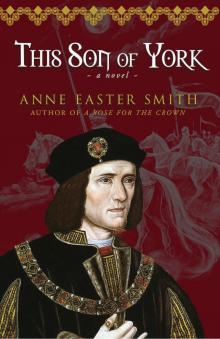 This Son of York
This Son of York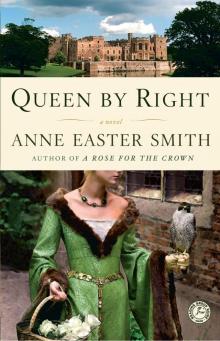 Queen By Right
Queen By Right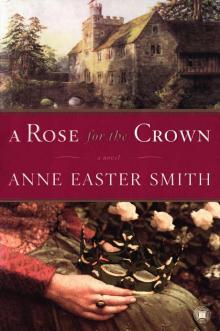 A Rose for the Crown: A Novel
A Rose for the Crown: A Novel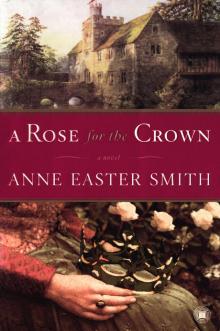 A Rose for the Crown
A Rose for the Crown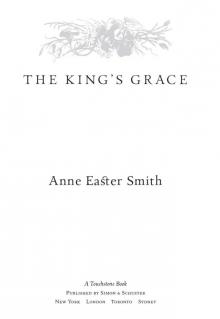 The King's Grace
The King's Grace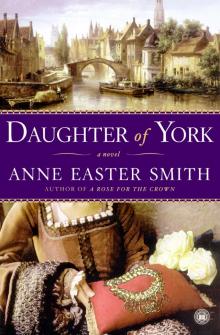 Daughter of York
Daughter of York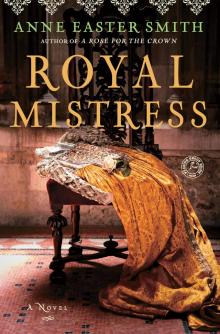 Royal Mistress
Royal Mistress